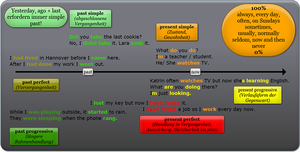Present Perfect/Exercises 2: Unterschied zwischen den Versionen
Markierung: Quelltext-Bearbeitung 2017 |
(l korr) |
||
| (7 dazwischenliegende Versionen desselben Benutzers werden nicht angezeigt) | |||
| Zeile 1: | Zeile 1: | ||
Genau wie bei "Do you. . . ?" und "Can he . . . ?" wird bei Fragen im [[ | Genau wie bei "Do you. . . ?" und "Can he . . . ?" wird bei Fragen im [[Present Perfect|Present Perfect]] das Hilfsverb ''has/have'' vor das Subjekt gestellt. | ||
== Interactive Exercises == | == Interactive Exercises == | ||
| Zeile 152: | Zeile 152: | ||
</div> | </div> | ||
{{Fortsetzung| | |||
vorher=more interactive exercises|vorherlink=Present Perfect/Exercises 1| | |||
weiter=Kontrastierung<br>(Unterschied zu simple past)|weiterlink=Present Perfect/Kontrastierung}} | |||
{{Present Perfect}} | |||
{{Tenses}} | {{Tenses}} | ||
[[Kategorie:Englisch]] | [[Kategorie:Englisch]] | ||
[[Kategorie: | [[Kategorie:Grammatik]] | ||
[[Kategorie:Interaktive Übung]] | [[Kategorie:Interaktive Übung]] | ||
{{SORTIERUNG:{{SUBPAGENAME}}}} | {{SORTIERUNG:{{SUBPAGENAME}}}} | ||
Aktuelle Version vom 14. Dezember 2022, 14:52 Uhr
Genau wie bei "Do you. . . ?" und "Can he . . . ?" wird bei Fragen im Present Perfect das Hilfsverb has/have vor das Subjekt gestellt.
Interactive Exercises
Past participles
Click on the numbers. Then put in the past participles of the given verbs:
| said | past participle of say |
| brought | past participle of bring |
| broken | past participle of break |
| caught | past participle of catch |
| hidden | past participle of hide |
| bitten | past participle of bite |
| ridden | past participle of ride |
| lain | past participle of lie |
| slept | past participle of sleep |
| stolen | past participle of steal |
questions & short answers
Form questions in the present perfect. Then give answers in the short form:
1. Have you ever been (you,ever be) to London yet? - No, I haven't (???) been there.
2. Have you already seen (you, already, see) the moon? - Yes, I have (???).
3. Where have you put (you, put) your English book? - Over there.
4. Have you already read (you, already, read) the newspaper today?
- No, I haven't (???). I haven't had (not, have) time this morning.
5. Has Peter met (Peter, meet) your friend so far? - Yes, he has (???) .
6. Have you done (you, do) your homework yet? - Yes, I have (???).
7. Has the dog had (the dog, have) your breakfast? - Yes, it has (???).
8. Have you polished (polish) your shoes? - Yes, I have (???).
9. Who has just heard (hear, just)the noise? - I have (???).
(For the apostrophe use the #-key next to the Enter-key.)
2. Have you already seen (you, already, see) the moon? - Yes, I have (???).
3. Where have you put (you, put) your English book? - Over there.
4. Have you already read (you, already, read) the newspaper today?
- No, I haven't (???). I haven't had (not, have) time this morning.
5. Has Peter met (Peter, meet) your friend so far? - Yes, he has (???) .
6. Have you done (you, do) your homework yet? - Yes, I have (???).
7. Has the dog had (the dog, have) your breakfast? - Yes, it has (???).
8. Have you polished (polish) your shoes? - Yes, I have (???).
9. Who has just heard (hear, just)the noise? - I have (???).
Past Participles
Memory - Find the matching sets!
| know | known |
| hear | heard |
| tell | told |
| ride | ridden |
| stand | stood |
| give | given |
| forget | forgotten |
| go | gone |
| speak | spoken |
Suchsel
Mark the past particples with your mouse.
| held |
| bought |
| shown |
| found |
| left |
| done |
| chosen |
Present Perfect - ist doch klar!
- Interactive Exercises 1 (regelmäßige Formen)
- Exercises 2 (unregelmäßige Formen)
- Kontrastierung (Gegenüberstellung) von Present Perfect und Simple Past
- How long …? - since & for (regelmäßige Formen)
- Present Perfect Progressive
Past Tense:
Present Tense:




